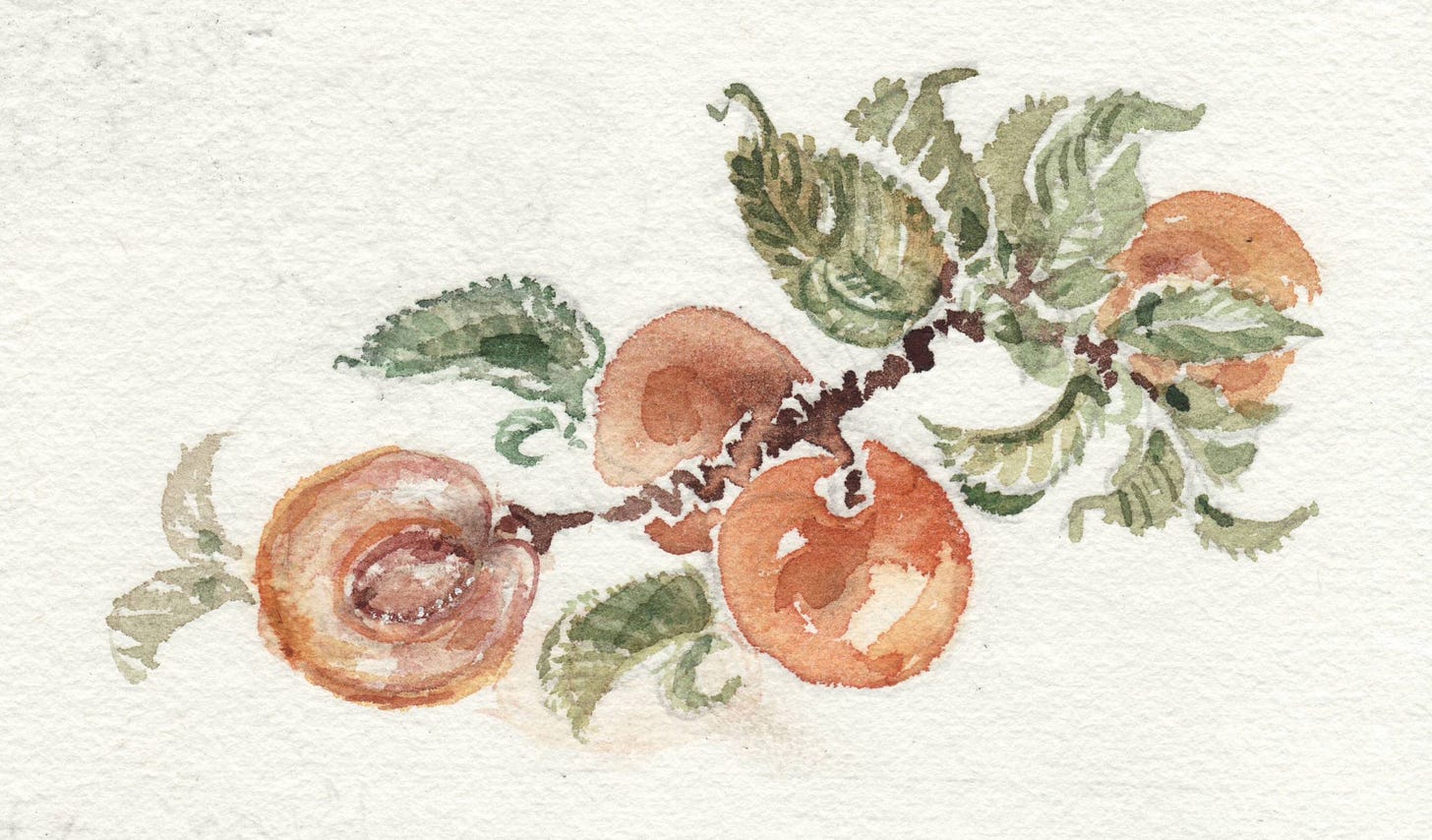Chutney just loves a clearout...
...what to do with good things from the back of the storeboard
Christmas is done and dusted, the days are getting longer (gradually), spring is on its way (slowly) - time to tie on the pinny, reach into the back of the shelf and tidy up the storecupoard. Whatever’s been tucked away - half-empty packets of raisins and sultanas, sticky containers of prunes and apricots, dried apple-rings like bits of old leather, little jars of ready-ground spices - none of it will last till the festive season comes round again next year.
My enthusiasm for putting-up chutney (storecupboard stuff was always ‘put up’) had always outpaced my family's capacity to eat it, which means there's still a jar or two left over from last year and sometimes even the year before that (chutney, like Christmas pudding, improves with age - like the rest of us, maybe). So I tip it all out into the new batch, where it bestows distinction, like the solera system in sherry-making.
Chutney is a friendly thing. The worst that can happen is that the fruit is watery and needs extra simmering to thicken it. But it's the devil of a sticker in the later stages - so choose a rainy afternoon when you don't mean to go anywhere, and keep stirring. If it all goes horribly wrong and a smoking crust forms on the bottom of the pan, tip whatever’s loose into a clean pan without stirring or scraping. Whatever sticks to the bottom of the first pan will taste burnt. The rest will be fine.
Here are a few of my own old favourites, bearing in mind that nothing is set in stone. While the method remains more or less the same throughout, the ingredients are simply a reaction to what’s in season and comes to hand. Feel free to replace in dried fruit with fresh when in season and change the balance of the spicing to suit yourself. Fruit from the freezer makes excellent chutney in double-quick time as it's already half-collapsed.
Sir James Martin’s Rhubarb Chutney
Sir James took commission with the East India Company and collected recipes from the courts of the Rajahs in the 1870’s and 80’s when his contemporary Colonel Arthur Kennedy-Herbert, aka ‘Wyvern’, was assembling Jottings from Madras.
Makes 2 or 3 one-pound jars
About a dozen well-grown rhubarb stalks
4 tablespoons raisins or sultanas
1 lb/500g brown sugar
2 thin-skinned lemons, scrubbed and diced
A whole garlic-head (a dozen fine fat cloves)
Palm-sized piece of fresh ginger root
1 pint/600ml malt vinegar
1 heaped teaspoon ground all-spice
1 heaped teaspoon salt
1/2 teaspoon peppercorns
Trim, rinse and finely-slice the rhubarb stalks. Dice the lemons, discarding the pips. Peel the garlic cloves and crush with the flat side of a heavy knife. Roughly chop the ginger. Put everything into a thick-based non-enamel pan, bring everything gently to the boil, stirring till the sugar dissolves and the rhubarb softens. Bubble it all up, stirring regularly (watch that base doesn’t stick) till the mixture becomes very thick. Pot up in jars and cover as usual. Keep for at least one month, says Sir James, before using.
Green Apple Chutney
Sour-sharp cooking-apples, Bramleys if you can find them, need robust spicing to compensate for missing out on the sunny flavours of summer. Gorgeous with toasted cheese or to sharpen up a ploughman’s lunch.
You’ll need 4-5 one-pound jars
4 lb/2k green apples, peeled, cored and chopped thinly sliced
1 lb/500g onions, skinned and thinly sliced
1 teaspoon salt
8 oz/250g sultanas
12 garlic cloves, skinned but left whole
2 fresh green chilies, de-seeded and chopped
6 cloves
1 teaspoon white peppercorns, roughly crushed
1 pint/600ml malt vinegar
1 lb/500g soft brown sugar
Put everything except the sugar into a large preserving pan, bring to the boil, turn down the heat, lid and cook gently for an hour, until all the vegetables are soft. Stir in the sugar and bubble up again. Turn down the heat, lid loosely and let it simmer, stirring regularly, for another 1 1/2 hours, until rich and thick. Pot while still warm in sterilised jars, top with a circle of greaseproof paper, and lid or cover with cellophane tied down with sturdy rubber bands or string (my gran used to save short lengths of string and tie them together to re-use).
Apricot and orange chutney
A beautiful deep orange chutney with a sweet-sharp citrussy flavour (the addition of a spoonful or two of last year’s marmalade would not come amiss). Remove the stones from the apricots, if necessary, before weighing.
Makes 3-4 one-pound jars
2 lb/1k dried apricots, soaked overnight to swell
4 oranges, grated zest and juice
2 medium onions, skinned and finely chopped
4 sultanas
1 tablespoon salt
1 teaspoon powdered cloves
1/2 pint/300ml vinegar
1 lb/500g brown sugar
1 teaspoon salt
Pack everything except the vinegar and sugar into a heavy-based preserving pan, add a cupful of water, bring to boil, turn down the heat, lid and simmer for 45 minutes, until the fruit is soft and the onions tender. Add the vinegar and sugar, and stir until the sugar has dissolved. Bring back to the boil, lid loosely and cook for another another hour or so, stirring regularly, until thick and spoonable. Pot up as above.
p.s Beloved paid subscribers will shortly be in receipt of recipes for a buttery Bengali Pineapple Chutney and a useful sweet-sour Prune and Apple Ketchup.
p.p.s. More storecupboard recipes and stories in Preserving, Potting and Pickling (Grub Street).











Great recipes. All that chopping. Must get back in form